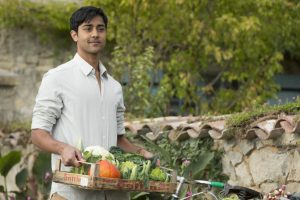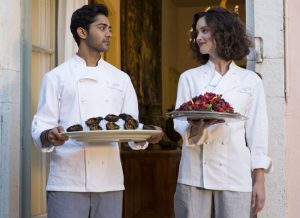Happy Bastille Day to all my French readers and viewers! I myself am not French nor of French descent (as far as I know, anyway), nor have I ever been to France, and I can’t even speak French.
Why, then, am I dedicating an entire blog post to the French holiday?
Simply because I have recently discovered a gem of a movie, a precious treasure that I have savored, and that must be shared with all of you. This film is The Hundred-Foot Journey, a beautiful film set in the wonderland of picturesque villages, open-air markets and sprawling vineyards and orchards that is rural France. And, parts of it also take place on Bastille Day, so that was all the connection I needed: I had to talk about this film eventually, so this seemed like the most natural place to do so. Allow me to explain why this film is necessary viewing – or, at least, why I feel that it is.

The Hundred-Foot Journey is not a new film: it was released in 2014, had a small but comfortable box-office run, and received mixed reviews. We’ll discuss its problems, but first let’s talk about what makes the film so good, so juicy, so delectable. Let’s discuss why I’m using all these references to taste: the film is a love-letter to the culinary cultures of France and India; two very different cuisines wrapped up together in this bite-sized treat. It follows an Indian family emigrating to France, led by their stubborn patriarch, Papa Kadam (Om Puri), who is trying to set up a restaurant where his extraordinarily talented son Hassan (Manish Dayal) can start a career for himself. But when the family ends up, accidentally, in the small village of Saint-Antonin-Noble-Val, they discover that their presence is unwelcome in the closely-knit community: a rival restaurateur by the name of Madame Mallory (Helen Mirren) quickly makes it her business to make the village as hostile to the family as possible, in an attempt to save her own high-end dining establishment from competition. From there, the plot unfolds. There’s romance, drama, and a dash of light-hearted comedy, but it’s all just seasoning on the beautiful three-course meal that is this movie, or should I say – cinematic cookbook.
Technically, the third course is a little more sour than the first two, but we’ll get to that in a minute. Let’s expand on the metaphor for a moment, and revel in the delights of French and Indian cuisine. I recommend that, if you take my suggestion and watch this film ASAP, you should have a delicious meal of your own prepared. It will make you very hungry, I can assure you of that: a film that can make a sea-urchin look like a mouthwatering morsel has done its job well. So well, in fact, that Hassan Kadam is apparently the third-greatest chef in movie history. From his family’s box of heirloom spices to the beautiful cookbooks lent to Hassan by his on-and-off love interest Marguerite (Charlotte Le Bon), the film is filled with constant reminders of more great meals to come, even when we’re not actually watching those meals being made – which is often. And each meal is different, depending on who’s making it and who’s eating it: we watch Papa and Hassan’s eyes fill with wonder as they are greeted by their first French dinner at Marguerite’s apartment, where the table is laden with some of the most beautiful cheeses you’ve ever seen; we witness the tension in Madame Mallory’s kitchen as she prepares a special meal for the President of France himself; we rejoice in Hassan’s naive first attempt to master the five basic sauces (which, if my sources are correct, are Béchamel, Velouté, Espagnole, Hollandaise and Sauce Tomat). The entire movie is centered around these quiet, intimate moments when the characters eat, with gusto and an almost holy reverence for what they are tasting. It’s the food that makes this movie so enjoyable – the idea that food is so important, so necessary, to people of all walks of life; to culture and community as well. It can bring people to tears as they recall the ghosts of flavors long forgotten, or it can spark passionate romance and thoughtful meditation. Wine, another staple of French cuisine, has a small part in igniting that romance, though it is largely absent from the hundred-foot journey that the Kadams travel.

The journey is both physical and spiritual: a journey from one country to another, from one restaurant to another, from one lifestyle to another. Papa Kadam and Madame Mallory’s rival restaurants stand across the road from each other – a road exactly one-hundred feet in width (a fact that is sometimes hard to believe, considering how small the road looks at times). But the two bitter opponents have journeys of self-discovery to travel as well: obviously, I won’t spoil anything that happens in the movie, but there’s a good deal of change and inner turmoil. The rural village is not very accepting of the Indian newcomers, for one thing, and neither party savors the idea of uniting their distinctly separate culinary styles of art.
From a technical standpoint, the film has its fair share of good and bad, like any film. I mentioned that the first two acts of the film (or courses of the meal, if we’d like to extend the metaphor) are the best: the third act isn’t necessarily bad, but it feels very different from the first two – more mainstream, more distanced, more remote. Things are happening on the screen, but we, the audience, no longer feel quite as intimate with the cast (who are all outstanding). I personally think the last thirty minutes shouldn’t have tried to take the film on a completely different course than the one it had been following, up to that point, almost perfectly. Thankfully, the final scene rescues the ending and gives us one scrumptious aftertaste to hold onto, but there is definitely some difficulty getting to that point.
But the first two acts – lovely, sentimental, and enchanting, the very best appetizer and main course that you could ask for. The film also has an ever-so-slightly old-fashioned quality to it: until the final half-hour, it is softly lit and the dialogue is soft-spoken. It’s sometimes difficult to remember that this little indie dramedy was produced by Steven Spielberg and Oprah Winfrey, two giants of the mainstream entertainment industry. Unfortunately, big-name producers don’t always inspire interest from general audiences – James Cameron learned that with Alita: Battle Angel, and Spielberg/Winfrey presumably learned that with The Hundred-Foot Journey, which is sadly neglected, almost completely forgotten, in fact. I don’t even know what inspired me to choose it, almost at random, from a wide selection of films on Netflix – but I am so glad that I did.

Hopefully, this post will inspire you to check it out for yourself, whether today, on this French national holiday, or any day of the year. I urge you to at least try it. I truly believe your life will be a little better for it.
Movie Rating: 9.4/10